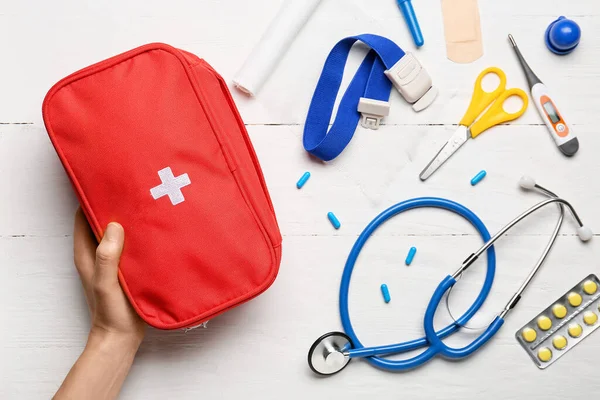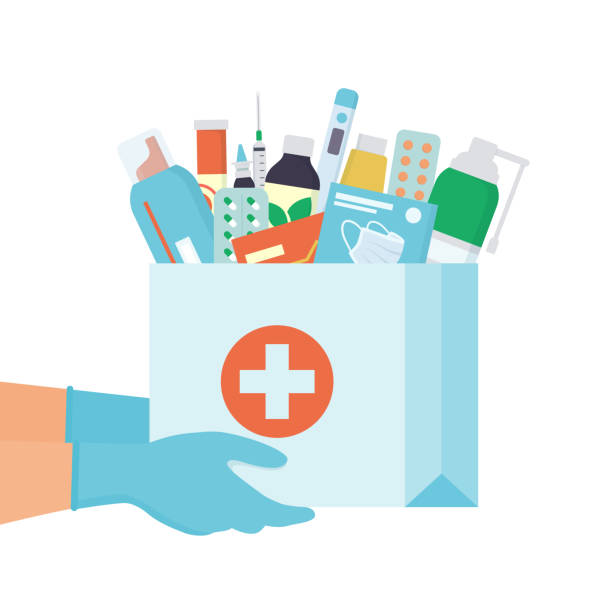Building Your Home Medical Supplies List for Everyday Needs
A well-prepared home medical supplies list is an essential aspect of ensuring the health and well-being of your family. This essay outlines the key categories of medical supplies to include in your list and highlights the significance of being equipped for everyday health emergencies.

1. Basic First Aid Supplies
A comprehensive home medical supplies list should start with basic first aid supplies. These include adhesive bandages, gauze pads, adhesive tape, antiseptic wipes, and scissors. These supplies are vital for treating minor cuts, scrapes, and burns that are common in daily life.
2. Over-the-Counter Medications
Stock your home with a range of over-the-counter medications for various ailments. Pain relievers, antacids, allergy medications, and cough syrups are examples of essential medications that can provide relief for common health issues.
3. Thermometers
A reliable digital thermometer is a must-have in your medical supplies list. It helps you monitor your family’s body temperature, a crucial indicator of overall health. A fever can often be the first sign of an underlying health concern.
4. Prescription Medications
If any family members are on prescription medications, ensure an adequate supply is maintained. Regularly check expiration dates and refill prescriptions as needed to avoid any disruptions in treatment.
5. Bandages and Dressings
For more significant injuries, having a variety of bandages and dressings is crucial. These can include sterile gauze, adhesive tape, elastic bandages, and non-stick wound pads. They are essential for properly dressing wounds to prevent infections and facilitate healing.
Emergency Preparedness: Home Medical Supplies for Unforeseen Situations
An effective home medical supplies list goes beyond daily needs and also prepares you for unforeseen emergencies. This essay focuses on the supplies you should have on hand to address unexpected medical situations.
1. CPR and First Aid Guides
While having supplies is crucial, knowledge of how to use them effectively is equally important. Include CPR and first aid guides in your list to ensure you’re equipped with the necessary information to respond to emergencies.
2. Emergency Medications
In emergencies such as severe allergies or anaphylaxis, having epinephrine auto-injectors can be lifesaving. Consult with a healthcare professional to determine if any family members require such emergency medications.

3. Wound Care Supplies
In addition to basic bandages, include wound care supplies like sterile saline solution, hydrogen peroxide, and antibiotic ointment. These supplies are essential for cleaning wounds and preventing infections.
4. Medical Tools
A well-rounded home medical supplies list should also include medical tools such as tweezers, scissors, and a flashlight. These tools can assist in removing splinters, cutting clothing to access wounds, and providing illumination in emergencies.
5. Personal Protective Equipment (PPE)
In light of recent events, having personal protective equipment such as gloves, masks, and face shields is prudent. These items are not only useful during a pandemic but can also help prevent the spread of infections in general.
Convenience and Preparedness: Creating a Comprehensive Home Medical Supplies List
Crafting a comprehensive home medical supplies list brings both convenience and peace of mind. This essay highlights the convenience of having a well-organized list and emphasizes the importance of being prepared for unexpected medical situations.
1. Storage and Organization
Organize your medical supplies in a designated area that is easily accessible. Use clear containers or labels to categorize items for quick retrieval during emergencies.
2. Regular Check and Restocking
Regularly inspect your home medical supplies and replenish items that have been used or have expired. A scheduled check ensures that you’re always prepared for any health-related situation.
3. Customizing for Family Needs
Consider the specific needs of your family members when creating your list. If someone has chronic health conditions, ensure you have the necessary supplies to manage their condition at home.
4. Preparedness for Natural Disasters
Your home medical supplies list should also align with your family’s disaster preparedness plan. In case of natural disasters or emergencies, having a well-equipped medical supplies kit can make a significant difference in your safety and well-being.
5. Seek Professional Advice
Consult with a healthcare professional to ensure that your home medical supplies list covers all necessary items for your family’s health needs. They can provide guidance on specific medications, supplies, and equipment that would be beneficial based on your family’s medical history.
In conclusion, a comprehensive home medical supplies list is an invaluable asset that combines convenience with preparedness. From everyday health needs to unforeseen emergencies, having the right supplies readily available can contribute to your family’s well-being and peace of mind.
